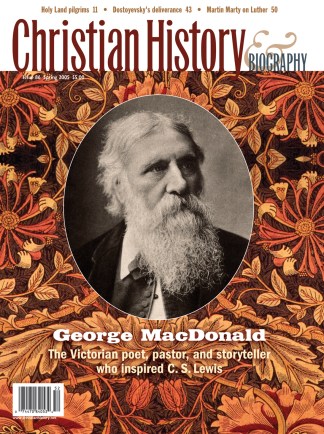“Are you born again?” Bill Moyers asked me in 1976 for a television program on a term that most Americans were first learning. My answer: “Yes.” When? February 26, 1928. Moyers, “You don’t look old enough for that early date?” He was thinking Baptistically; I was talking about my baptism at three weeks of age. “And that does it for life?” he asked. I answered, “‘Yes’ and ‘no.’ I was also ‘born again’ this morning.”
This plunge to the heart of Luther’s theology summarizes my changed life. These lines in his Small Catechism hit me forcefully when I was in my twenties: “In the morning, as soon as you get out of bed, you are to make the sign of the holy cross and say: ‘God the Father, Son, and Holy Spirit watch over me. Amen.” Further directions follow: say the Apostles Creed, pray the Lord’s Prayer. … Then “you are to go to your work joyfully.”
Those who come to baptism at the age of personal accountability will have other ways to greet each day, and can have analogous experiences as children of God. For Luther, baptism “signifies that the old creature in us … is to be drowned and die through daily … repentance, and … that daily a new person is to come forth and arise up to live before God in righteousness and purity forever.” Luther cited Romans 6:4, and added his own accent on daily, as I have done with italics here.
Early on, the brunt of this call by Luther to be born again daily and his citation of Romans 6 did not shake or shape me. Nurtured in a home where this way of life was taken for granted; daydreaming through an overly scholastic Lutheran pre-theological school, I later understood Luther’s “tower experience” of grace from reading Paul’s epistles. This came suddenly in 1947 in seminary studies under passionate “neo-Lutheran” scholars, and gradually (after summer 1952) when as a pastor I related this teaching to the lives of others.
This signing of the cross “signifies;” it involves no hint of superstition or magic. What follows it is a demand for the gift of repentance. I did not and do not seek a Luther-like emotional trauma and a shattering onrush of new experience. Still, I learned from Luther to put to work this understanding of dailiness. When he was tempted, in doubt, depression, or near-despair, he would remind himself: baptizatus sum, “I am baptized,” and recognize a change.
The urgent call to baptismal repentance means a drastic turn from the old ways of yesterday and to new ways for tomorrow, with the gift of strength for today. The public image of Lutherans, as fostered by radio’s Garrison Keillor types, finds a timid, do-I-dare-thinking people. It frustrates me to observe fellow Lutherans unnecessarily carrying the weight of yesterday’s wrongs and burdening themselves with worries over tomorrow. Jesus would have none of either, nor would Luther, nor should I.
In pastoral theology and care I would turn this discipline into a virtual therapy. I would tell stories about Luther, who asked “Is God gracious?” while theologians today say people ask “Is God … ?” Most contemporaries cannot identify with the pious monk and virtuoso repenter who bored his superior with six-hour monologues about his sin. Fortunately this confessor, John Staupitz, would not let him wallow in his petty follies. He was to realize that he was free to be an “alter Christus,” an “other” Christ to his neighbor, making faith active in love. Luther’s discovery and teaching move me still. Daily.
Martin E. Marty is the Fairfax M. Cone Distinguished Service Professor Emeritus at the University of Chicago and author of Martin Luther (Penguin Putnam, 2004). He is an ordained Lutheran minister.
Copyright © 2005 by the author or Christianity Today/Christian History & Biography magazine.Click here for reprint information on Christian History & Biography.










